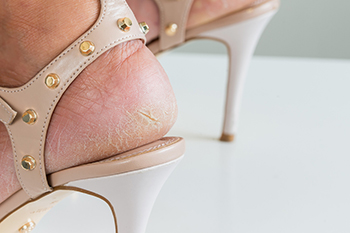
Cracked heels, which are a common foot condition, are usually non-threatening but can become potentially serious. It is best to try to prevent cracked heels from developing in the first place. It is a good idea to examine your heels and if they begin to feel dry, apply moisturizer regularly. Also, if you gain weight, the pressure on the heels increases and calluses may form. Extra weight, quite common among pregnant women, expands the heel skin while walking and standing and can cause cracks to widen. Wearing sling-back shoes, sandals, or flip flops also may cause the heels to dry out. Dried and cracked heels also can be a problem for those with diabetes, which can diminish the moisture supply to the feet. If the cracked skin on the heels does not improve with daily foot care precautions, they may deepen into fissures or begin to bleed. This opening of the skin can invite bacterial or fungal infections. An antiseptic lotion may help to keep the area clean. If cracked heels become an ongoing problem, it is suggested that you make an appointment with a podiatrist who can examine the area, and determine the best course of treatment.
Cracked heels are unsightly and can cause further damage to your shoes and feet. If you have any concerns, contact Dr. Kevin Davis from Davis Foot & Ankle Centers. Our doctor can provide the care you need to keep you pain-free and on your feet.
Cracked Heels
Cracked heels appear unappealing and can make it harder for you walk around in sandals. Aside from looking unpleasant, cracked heels can also tear stockings, socks, and wear out your shoes. There are several methods to help restore a cracked heel and prevent further damage.
How Do You Get Them?
Dry skin is the number one culprit in creating cracked heels. Many athletes, walkers, joggers, and even swimmers suffer from cracked heels. Age and skin oil production play a role to getting cracked heels as well.
Promote Healing
Over the counter medicines can help, especially for those that need instant relief or who suffer from chronic dry feet.
Wear Socks – Wearing socks with medicated creams helps lock in moisture.
Moisturizers – Applying both day and night will help alleviate dryness which causes cracking.
Pumice Stones – These exfoliate and remove dead skin, which allows for smoother moisturizer application and better absorption into the skin.
Change in Diet
Eating healthy with a well-balanced diet will give the skin a fresh and radiant look. Your body responds to the kinds of food you ingest. Omega-3 fatty acids and zinc supplements can also revitalize skin tissue.
Most importantly, seek professional help if unsure how to proceed in treating cracked heels. A podiatrist will help you with any questions or information needed.
If you have any questions, please feel free to contact our office located in Springfield, TN . We offer the newest diagnostic and treatment technologies for all your foot care needs.
